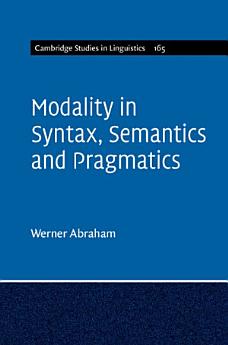Modality in Syntax, Semantics and Pragmatics
Sep 2020 · Cambridge Studies in Linguistics Book 165 · Cambridge University Press
Ebook
455
Pages
reportRatings and reviews aren’t verified Learn More
About this ebook
What do we mean when we say things like 'If only we knew what he was up to!' Clearly this is more than just a message, or a question to our addressee. We are expressing simultaneously that we don't know, and also that we wish to know. Several modes of encoding contribute to such modalities of expression: word order, subordinating subjunctions, sentences that are subordinated but nevertheless occur autonomously, and attitudinal discourse adverbs which, far beyond lexical adverbials of modality, allow the speaker and the listener to presuppose full agreement, partial agreement under presupposed conditions, or negotiation of common ground. This state of the art survey proposes a new model of modality, drawing on data from a variety of Germanic and Slavic languages to find out what is cross-linguistically universal about modality, and to argue that it is a constitutive part of human cognition.
About the author
Werner Abraham is Professor Emeritus in Linguistics and Mediaeval Studies at the Rijksuniversiteit Groningen, The Netherlands, Honorary Professor at the Universität Wien, and is still active at the Ludwig Maximilan University of Munich, Germany. He is author of more than 350 articles, 5 monographs, and 35 book collections.
Rate this ebook
Tell us what you think.
Reading information
Smartphones and tablets
Install the Google Play Books app for Android and iPad/iPhone. It syncs automatically with your account and allows you to read online or offline wherever you are.
Laptops and computers
You can listen to audiobooks purchased on Google Play using your computer's web browser.
eReaders and other devices
To read on e-ink devices like Kobo eReaders, you'll need to download a file and transfer it to your device. Follow the detailed Help Center instructions to transfer the files to supported eReaders.







